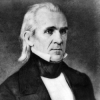James K. Polk

James K. Polk
James Knox Polkwas the 11th President of the United States. Polk was born in Mecklenburg County, North Carolina. He later lived in and represented Tennessee. A Democrat, Polk served as the 13th Speaker of the House of Representatives—the only president to have served as House Speaker—and Governor of Tennessee. Polk was the surprisecandidate for president in 1844, defeating Henry Clay of the rival Whig Party by promising to annex the Republic of Texas. Polk was a leader of Jacksonian Democracy...
NationalityAmerican
ProfessionUS President
Date of Birth2 November 1795
CityPineville, NC
CountryUnited States of America
When I observed a strong man approaching I generally took advantage of him by being a little quicker than he was and seizing him by the tip of the fingers, giving him a hearty shake, and thus preventing him from getting a full grip upon me.
Public opinion: May it always perform one of its appropriate offices, by teaching the public functionaries of the State and of the Federal Government, that neither shall assume the exercise of powers entrusted by the Constitution to the other.
Minorities have a right to appeal to the Constitution as a shield against such oppression.
I cannot, whilst President of the United States, descend to enter into a newspaper controversy.
With me it is exceptionally true that the Presidency is no bed of roses.
There is more selfishness and less principle among members of Congress than I had any conception of, before I became President of the U.S.
There are four great measures for my administration - a reduction of tariff, an independent treasury, settlement of the Oregon boundary and acquisition of California.
We must ever mandate the principle that the people of this continent alone have the right to decide their own destiny.
The world has nothing to fear from military ambition in our Government.
The gratitude ... should be commensurate with the boundless blessings which we enjoy.
Under the benignant providence of Almighty God the representatives of the States and of the people are again brought together to deliberate for the public good.
All distinctions of birth or of rank have been abolished. All citizens, whether native or adopted, are placed upon terms of precise equality. All are entitled to equal rights and equal protection.
One great object of the Constitution was to restrain majorities from oppressing minorities or encroaching upon their just rights.
No president who performs his duties faithfully and conscientiously can have any leisure.